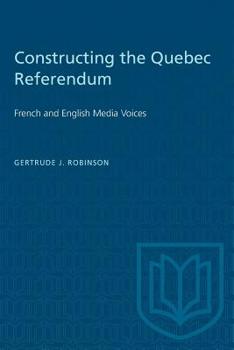Constructing the Quebec Referendum
The 1980 Quebec referendum was a momentous event that redefined Canada's nationalist ideologies. While the political implications of the referendum have been widely analysed, this is the first sustained study of the role played by the media in shaping and interpreting the referendum campaign.
Robinson addresses interrelated issues in public opinion creation during the 1980 campaign. She explores how the ideologies of Quebec and Canadian nationalism were constructed and modified by the separate French and English networks, and how their idiosyncratic visual styles and thematic selections reinforced Montreal viewers' linguistic and political divisions. In addition, Robinson compares French and English media professionals and discovers how their work settings and their perception of their roles had become polarized a decade before through the imposition of the 1970 War Measures Act. The two journalistic groups were affected by its imposition in radically different ways, resulting in much more self-censorship and bland programming on the part of the French media than the English during the 1980 referendum. Finally, Robinson demonstrates how the instant playback capabilities of television, newly developed at the time of the referendum, have affected news discourses and turned electoral coverage into personalized and sensationalized 'tabloid formats.' These formats narrowed citizen's abilities to conceive of alternative political interpretations and actions.
Robinson addresses interrelated issues in public opinion creation during the 1980 campaign. She explores how the ideologies of Quebec and Canadian nationalism were constructed and modified by the separate French and English networks, and how their idiosyncratic visual styles and thematic selections reinforced Montreal viewers' linguistic and political divisions. In addition, Robinson compares French and English media professionals and discovers how their work settings and their perception of their roles had become polarized a decade before through the imposition of the 1970 War Measures Act. The two journalistic groups were affected by its imposition in radically different ways, resulting in much more self-censorship and bland programming on the part of the French media than the English during the 1980 referendum. Finally, Robinson demonstrates how the instant playback capabilities of television, newly developed at the time of the referendum, have affected news discourses and turned electoral coverage into personalized and sensationalized 'tabloid formats.' These formats narrowed citizen's abilities to conceive of alternative political interpretations and actions.
Format:Paperback
Language:English
ISBN:0802078907
ISBN13:9780802078902
Release Date:December 1998
Publisher:University of Toronto Press
Length:274 Pages
Weight:0.89 lbs.
Dimensions:0.7" x 6.2" x 8.8"
Customer Reviews
0 rating





